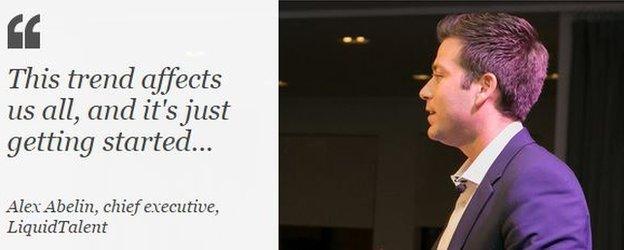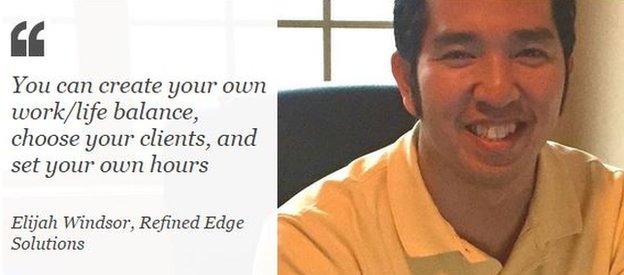Is the 'gig economy' turning us all into freelancers?
- Published

Cloud-based talent marketplaces are enabling firms to find the right people for every project
When you're burnt out at work, it's easy to dream of quitting your job and going freelance.
Wouldn't it be great to ditch the micro-managing boss, take on exciting new projects whenever you want, and work the hours that suit you?
Well, thanks to the rise of on-demand talent marketplaces, the so-called "gig economy" is fast becoming a reality.
Cloud-based platforms are making it easier for firms to find the people they need from a global talent pool, and for freelancers to advertise their skills.
For example, Ying Li Looi-Garman, a freelance video producer based in Singapore, is one of millions of workers worldwide sidestepping traditional recruitment agencies.
She picks up around four to 10 jobs a month via 90 Seconds, external, a cloud-based video production platform with a network of over 5,000 freelancers in 70 countries.

Video producer Ying Li Looi-Garman says she can "accept work when I want"
A year after joining, all of Ms Ying's paid work now comes via the platform, where she has a profile page listing her experience and a showreel of her work.
"90 Seconds offers flexibility," she says. "I work from home and I can just accept work when I want."
Another advantage, she says, is that all the communication with the client is via one central hub.

Video production platform 90 Seconds features the work of more than 5,000 freelancers globally
"If there's a new script change or say I've made a video cut, the client gets updated through the platform."
'Uber for local jobs'
For companies desperate for flexible workers, these platforms are both convenient and cost-effective.
"With millions of experts from all around the world, people can get help with their business within minutes of posting a project," says Matt Barrie, chief executive of Sydney-based Freelancer.com, external, whose clients include Nasa.
"They can scale up or down as needed. It offers flexibility of budget, space and time, and rates that people can afford, with lower overhead expenses."

Freelancer.com's Matt Barrie says clients can get help with a project "within minutes"
Freelancer.com also offers a Local Jobs service which it describes as "Uber for local jobs", allowing companies to find freelancers within a 30-mile (50km) radius, and not just for the typical online work involved in the gig economy, but for location-based tasks, such as deliveries.
It is the easy access to specific skills that employers like, says Alex Abelin, chief executive of New York-based LiquidTalent, external, an on-demand marketplace for designers and developers.
"Many times, employers don't need full-time support, but rather targeted, objective talent infusion," he says.

"For example, at LiquidTalent, we are working on a six-week intense data project. We have a team of on-site and off-site support to make our data housing and reporting much more secure and visual.
"We don't need to hire this team full-time, but we do need them for six weeks."
Best of the bunch
Over in Raleigh, North Carolina, Elijah Windsor sits on both sides of the gig economy.
He finds work as a computer programmer through freelance software and engineering marketplace Toptal, external. But he also uses the same platform to recruit developers for his own tech start-up, Refined Edge Solutions.

Toptal is choosy about who it allows onto its platform - only accepting 3% of applicants on average.
"You can create your own work/life balance, choose your clients, and set your own hours," says Mr Windsor.
"If you only want to work part-time, that's fine, or you could work 80 hours a week if you wanted to.
"A developer I hired through Toptal recently lives in Germany, but he worked US hours so he could spend time with his family during the day."
Mr Windsor also rates the San Francisco-based platform highly for pairing companies with a "matching team" that often includes developers.
"Since they're in the field, they're not just throwing out bait to catch random fish - they know exactly what you're looking for," he says.
Eyes on the prize
This on-demand economy is also leading to the rise of competition-based marketplaces such as Innocentive, external, where companies can post tough work challenges for innovators to solve in return for prize money.
"Our clients get fresh perspectives and a diverse range of creative solutions for their pressing organisational concerns, all in a very cost-effective way," says Innocentive director Greg Eredics.

More features about the Future of Work


"We've had clients solve problems they'd been working on for 15 years in just 60 days with our offering."
One of its clients, Italian power utility Enel, has been using the platform since September, and has found solutions to eight problems across areas from renewable energy to operations.
Enel's chief innovation and sustainability officer, Ernesto Ciorra, says the approach helps the company find the right people at the right time and improves "the speed of the innovation process".
But what are the risks of hiring people on the hoof?

While the freelance lifestyle may seem appealing, job security disappears
"You might want to validate who the freelancer says they are and what qualifications and experience they have," warns Anne-Marie Malley, UK human capital leader at consultancy firm Deloitte.
"You should also be careful around what data you share because that person is not a full-time employee - they could be working with your competitors the following week.
"You need to be thoughtful as to where and how you share high-risk data."
Growing market
Such concerns aside, the gig economy is clearly booming and set for rapid growth.
In the UK, the number of self-employed people has risen to nearly five million, approaching the number who work in the public sector. And in the US, around 54 million people are now freelance, roughly a third of all workers.
PeoplePerHour, external, an online freelance marketplace, forecasts that one in two people in the US and the UK will be freelance by 2020.
And the market for gig economy platforms and related services will be worth almost $63bn (£43bn; €56bn) globally by 2020, forecasts consultancy PwC. In 2014, this global market was valued at $10bn.
"The gig economy will also... see more professionals in sales, marketing, finance and law adopting a gig-economy mentality, not just the usual suspects of software development or event planning," says LiquidTalent's Mr Abelin.
"This trend affects us all and it's just getting started."

Follow Technology of Business editor Matthew Wall on Twitter @matthew_wall, external